
Extra Texture (Read All About It) is the sixth studio album by English musician George Harrison, released on 22 September 1975. It was Harrison's final album under his contract with Apple Records and EMI, and the last studio album issued by Apple. The release came nine months after his troubled 1974 North American tour with Ravi Shankar and the poorly received Dark Horse album.
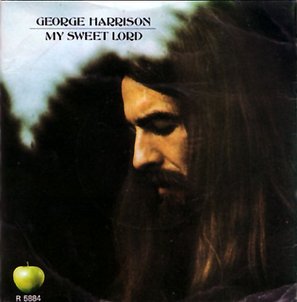
"My Sweet Lord" is a song by English musician George Harrison, released in November 1970 on his triple album All Things Must Pass. It was also released as a single, Harrison's first as a solo artist, and topped charts worldwide; it was the biggest-selling single of 1971 in the UK. In America and Britain, the song was the first number-one single by an ex-Beatle. Harrison originally gave the song to his fellow Apple Records artist Billy Preston to record; this version, which Harrison co-produced, appeared on Preston's Encouraging Words album in September 1970.
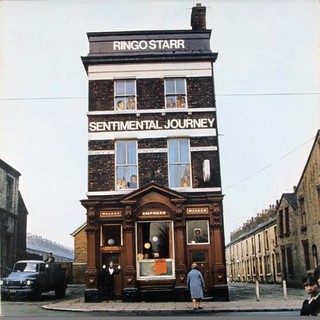
Sentimental Journey is the debut solo album by English rock musician Ringo Starr. It was released by Apple Records in March 1970 as the Beatles were breaking up. The album is a collection of pre-rock 'n' roll standards that Starr recalled from his childhood in Liverpool. As a departure from the experimental quality that had characterised solo LPs by George Harrison and John Lennon since 1968, it was the first studio album by an individual Beatle to embrace a popular music form.

"It Don't Come Easy" is a song by English rock musician Ringo Starr that was released as a non-album single in April 1971. It was produced by Starr's former Beatles bandmate George Harrison, who also helped write the song, although only Starr is credited. Recording for the track took place in March 1970 at Trident Studios in London, with overdubs added in October. Starr and Harrison performed the song together in August 1971 at Harrison's Concert for Bangladesh shows in New York City, a recording from which was released on the live album of the same name. Starr has continued to perform it in subsequent decades with his All-Starr Band.
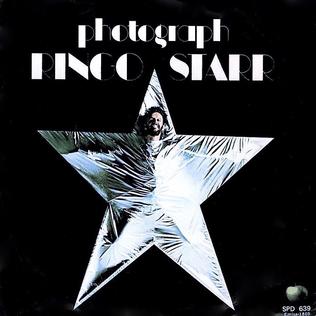
"Photograph" is a song by English rock musician Ringo Starr that was released as the lead single from his 1973 album Ringo. Starr co-wrote it with George Harrison, his former bandmate from the Beatles. Although they collaborated on other songs, it is the only one officially credited to the pair. A signature tune for Starr as a solo artist, "Photograph" was an international hit, topping singles charts in the United States, Canada and Australia, and receiving gold disc certification for US sales of 1 million. Music critics have similarly received the song favourably; Stephen Thomas Erlewine of AllMusic considers it to be "among the very best post-Beatles songs by any of the Fab Four".

That's The Way God Planned It is the fourth studio album by American musician Billy Preston, released in August 1969 on Apple Records. The album followed Preston's collaboration with the Beatles on their "Get Back" single and was produced by George Harrison. The title track became a hit in the UK when issued as a single. Aside from Harrison, other contributors to the album include Keith Richards, Eric Clapton and Doris Troy.

Encouraging Words is the fifth studio album by American soul musician Billy Preston, released in September 1970 on Apple Records. It was the last of Preston's two albums for the Beatles' Apple label, after which he moved to A&M Records. The album was co-produced by George Harrison and Preston. Harrison's songs "All Things Must Pass" and "My Sweet Lord" were issued here for the first time, two months before his own recordings appeared on his triple album All Things Must Pass.

"What Is Life" is a song by English rock musician George Harrison from his 1970 triple album All Things Must Pass. In many countries, it was issued as the second single from the album, in February 1971, becoming a top-ten hit in the United States, Canada and elsewhere, and topping singles charts in Australia and Switzerland. In the United Kingdom, "What Is Life" appeared as the B-side to "My Sweet Lord", which was the best-selling single there of 1971. Harrison's backing musicians on the song include Eric Clapton and the entire Delaney & Bonnie and Friends band, with whom he had toured during the final months of the Beatles. Harrison co-produced the recording with Phil Spector, whose Wall of Sound production also employed a prominent string arrangement by John Barham and multiple acoustic rhythm guitars, played by Harrison's fellow Apple Records signings Badfinger.
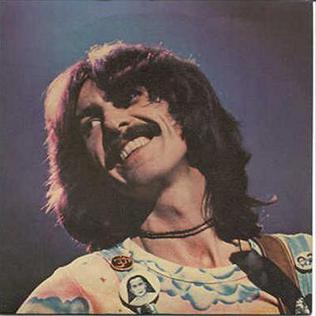
"You" is a song by English musician George Harrison, released as the opening track of his 1975 album Extra Texture . It was also the album's lead single, becoming a top 20 hit in America and reaching number 9 in Canada. A 45-second instrumental portion of the song, titled "A Bit More of You", appears on Extra Texture also, opening side two of the original LP format. Harrison wrote "You" in 1970 as a song for Ronnie Spector, formerly of the Ronettes, and wife of Harrison's All Things Must Pass co-producer Phil Spector. The composition reflects Harrison's admiration for 1960s American soul/R&B, particularly Motown.

"Bangla Desh" is a song by English musician George Harrison. It was released as a non-album single in July 1971, to raise awareness for the millions of refugees from the country Bangladesh, formerly known as East Pakistan, following the 1970 Bhola cyclone and the outbreak of the Bangladesh Liberation War. Harrison's inspiration for the song came from his friend Ravi Shankar, a Indian-Bengali musician, who approached Harrison for help in trying to alleviate the suffering. "Bangla Desh" has been described as "one of the most cogent social statements in music history" and helped gain international support for Bangladeshi independence by establishing the name of the fledgling nation around the world. In 2005, United Nations Secretary-General Kofi Annan identified the song's success in personalising the Bangladesh crisis, through its emotive description of Shankar's request for help.
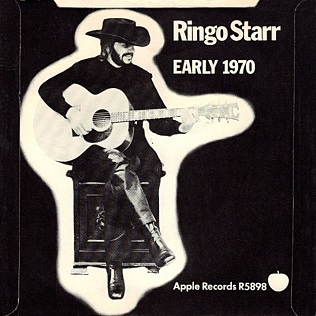
"Early 1970" is a song by English rock musician Ringo Starr that was released as the B-side of his April 1971 single "It Don't Come Easy". A rare example of Starr's songwriting at the time, it was inspired by the break-up of the Beatles and documents his relationship with his three former bandmates. The lyrics to the verses comment in turn on Paul McCartney, John Lennon and George Harrison as individuals, and the likelihood of each of them making music with Starr again. In the final verse, Starr offers a self-deprecating picture of his musical abilities and expresses the hope that all four will play together in the future. Commentators have variously described "Early 1970" as "a rough draft of a peace treaty" and "a disarming open letter" from Starr to Lennon, McCartney and Harrison.
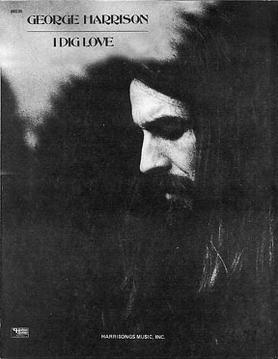
"I Dig Love" is a song by English rock musician George Harrison from his 1970 triple album All Things Must Pass. A paean to free love, it marks a departure from the more profound, spiritually oriented subject matter of much of that album. Musically, the song reflects Harrison's early experimentation with slide guitar, a technique that he was introduced to while touring with Delaney & Bonnie and Friends in December 1969.
"Hear Me Lord" is a song by English rock musician George Harrison from his 1970 triple album All Things Must Pass. It was the last track on side four of the original LP format and is generally viewed as the closing song on the album, disc three being the largely instrumental Apple Jam. Harrison wrote "Hear Me Lord" in January 1969 while still a member of the Beatles. The band rehearsed it briefly at Twickenham Film Studios that month, but it was passed over for inclusion on what became their final album, Let It Be.
"Sing One for the Lord" is a song by American soul musician Billy Preston that was released in September 1970 on his Apple Records album Encouraging Words. It was written by George Harrison and Preston. Although the pair frequently collaborated as recording artists from 1969 onwards, it is their only formal songwriting collaboration. The song is in the gospel style and was written in praise of the two musicians' respective deities.
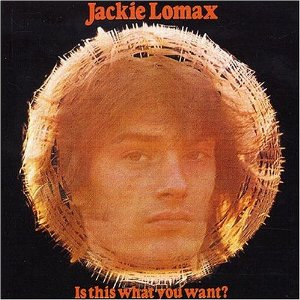
Is This What You Want? is the debut album by English rock and soul singer Jackie Lomax, released in 1969 on the Beatles' Apple record label. It was produced by George Harrison and features contributions from Harrison's Beatles bandmates Paul McCartney and Ringo Starr. The album includes Lomax's debut single for Apple, the Harrison-written "Sour Milk Sea". The US version added "New Day", which was produced by Lomax and released as a non-album single in Britain.

Doris Troy is an album released in 1970 on the Beatles' Apple Records label by American soul singer Doris Troy. It features songs written by Troy and a number of the participants on the sessions, including George Harrison, Stephen Stills, Klaus Voormann and Ringo Starr. Through the extended period of recording, the album became an all-star collaborative effort, typical of many Apple projects during 1968–70, although it was Troy's only album on the Beatles' label. Other guest musicians included Billy Preston, Peter Frampton, Leon Russell, Eric Clapton and members of the Delaney & Bonnie Friends band. Like the Harrison-produced single "Ain't That Cute", Doris Troy failed to chart in Britain or America on release.

"That's the Way God Planned It" is a song by American musician Billy Preston and the title track to his 1969 album of the same name. Issued as a single, the song was Preston's first release on the Beatles' Apple record label, following his guest role on the band's "Get Back" single. The lyrics to "That's the Way God Planned It" partly reflect the long musical apprenticeship Preston had served since childhood, mentored by artists such as Sam Cooke and Ray Charles, while musically the track combines the gospel tradition with rock. Produced by George Harrison in London, the recording also features contributions from Eric Clapton, Keith Richards, Ginger Baker and Doris Troy. Having been edited down to three minutes for its single release, the full version appeared on the album, as "That's the Way God Planned It ".

The Radha Krsna Temple is a 1971 album of Hindu devotional songs recorded by the UK branch of the Hare Krishna movement – more formally, the International Society for Krishna Consciousness (ISKCON) – who received the artist credit of "Radha Krishna Temple (London)". The album was produced by George Harrison and released on the Beatles' Apple record label. It compiles two hit singles, "Hare Krishna Mantra" and "Govinda", with other Sanskrit-worded mantras and prayers that the Temple devotees recorded with Harrison from July 1969 onwards.

Brother is the debut album by the American pop-rock duo Lon & Derrek Van Eaton. It was released on the Beatles' Apple record label in September 1972 in the United States and February 1973 in Britain. It includes the single "Sweet Music", produced by George Harrison, and was otherwise produced by Klaus Voormann, a friend and longtime associate of the Beatles. On release, the album received favorable reviews from music critics but failed to achieve commercial success. Rolling Stone critic Stephen Holden hailed it as a "staggeringly impressive first album".
Joe Greene is an American gospel and soul singer and songwriter. A male soprano, he was especially active in the late 1960s and the 1970s as a backing vocalist for rock artists seeking to achieve a more polished vocal performance on their recordings. As a songwriter during that time, he frequently collaborated with Billy Preston, co-writing the latter's Grammy-winning 1972 hit "Outa-Space" and other songs.

















